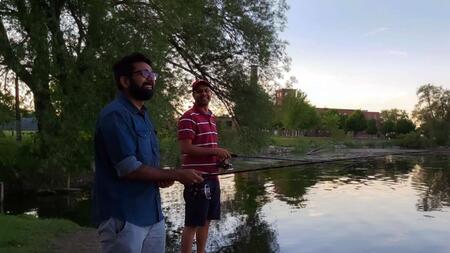“We had to really step up.”
That was the conclusion that Dr. Prashant Agrawal and his Plantee Bioplastics co-founder Dr. Praphulla had reached about their young firm.
The two, (a third partner, CEO Richard Chen, currently lives in Vancouver) had created the company to find ways to reduce plastic waste in the environment by developing new materials that were bio-based, biodegradable or both. Agrawal, a chemist by training and Praphulla, a chemical engineer met at Queen’s in 2013 and decided to combine their expertise and training.
“Innovation Solutions Canada had a challenge to propose a solution to the ghost fishing problem,” says Praphulla. Modern nets and other fishing gear are made from polymer plastics. They are tough and durable, but never break down. If a net is lost, it keeps catching, and killing, fish. It is a major problem.

“We jumped on this problem because we like to get in a canoe and fish a bit, and every time we go out, we see lines and net bags on the side of the stream. We were annoyed that these polymers don’t degrade in our lifetimes. They will be there forever,” says Praphulla, who goes by only one name. In late 2018, Plantee Bioplastics was born.
Since then they have received two grants totalling several hundred thousand dollars from the Canada’s Department of Fisheries and Oceans to work on developing biodegradable alternatives to synthetic nets, lines and other related fishing gear.
“We are quite proud of this,” says Praphulla, but, says Agrawal, the partners were stymied about the next moves needed to grow the company: “How do you raise $1 million, $10 million -- or any amount -- from venture capitalists?”
The people at Queen’s Partnerships and Innovation suggested they enroll in their new Growth Accelerator. Offered in March 2020 for the first time, the new program was intended to help firms like Plantee Bioplastics move to the next level.
And it’s already bearing results. “It provided us with important contacts in the world of venture capitalists as well as marketing contacts,” says Agrawal. “Through one contact we were able to start a collaboration with St. Lawrence College and we have other contacts that we would love to explore.”
“The program,” says Praphulla, “helped us to focus on streamlining our business model. We were not focused, and they helped us narrow down what we wanted to do and where we wanted to go and to reach that, what capital we needed. We are used to working off on our own. It was really refreshing to work with people and get feedback at the same time.”
“Absolutely, I would recommend the program,” says Agrawal.
“Without hesitation,” says Praphulla.
The Wings/Growth Acceleration program was made possible with support from the Government of Canada to Queen’s University through the Federal Economic Development Agency for Southern Ontario and the Scale-Up Platform Project which is led by Invest Ottawa in eastern Ontario and by Queen’s in the Kingston region.
 About Vice-Principal Research
About Vice-Principal Research